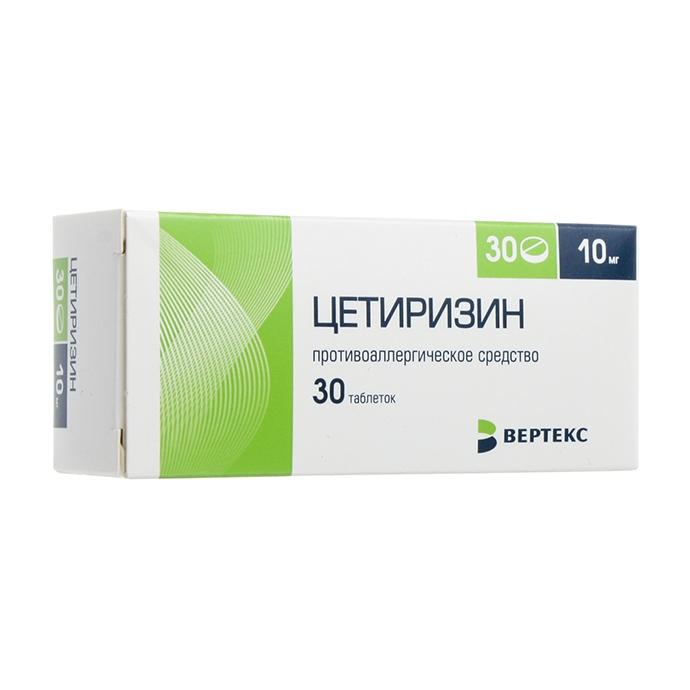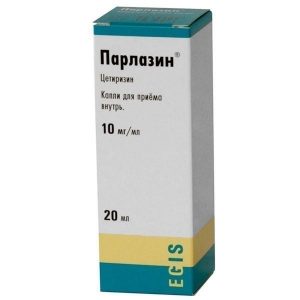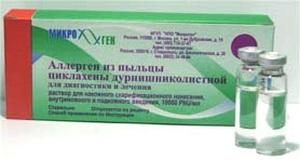Description
Packaging
30 tube droppers of 0.3 ml.
Pharmacological action
Cetirizine is a competitive histamine antagonist, a hydroxyzine metabolite that blocks H1-histamine receptors. It prevents the development and facilitates the course of allergic reactions, has an antipruritic and antiexudative effect.
Affects the early stage of allergic reactions, limits the release of inflammatory mediators in the late stage of the allergic reaction, reduces the migration of eosinophils, neutrophils and basophils. Reduces capillary permeability, prevents the development of tissue edema, relieves spasm of smooth muscles.
stitches the skin reaction to the introduction of histamine, specific allergens, as well as cooling (with cold urticaria).
Virtually no anticholinergic and antiserotonin effects. In therapeutic doses, it practically does not cause a sedative effect. The onset of action after a single dose of 10 mg of cetirizine – after 20 minutes (in 50% of patients) and after 60 minutes (in 95% of patients), lasts more than 24 hours.
Against the background of the course of treatment, tolerance to the antihistamine action of cetirizine does not develop. After discontinuation of treatment, the effect lasts up to 3 days.
Pharmacokinetics
Quickly absorbed from the gastrointestinal tract, the time to reach Cmax after oral administration is 1 hour. Food does not affect the completeness of absorption (AUC), but prolongs the time to reach Cmax by 1 h and reduces the value of Cmax by 23%. When taken at a dose of 10 mg 1 time / day for 10 days, the equilibrium plasma concentration is 310 ng / ml and is observed 0.5-1.5 hours after administration.
Communication with plasma proteins is 93% and does not change at a concentration of cetirizine in the range of 25-1000 ng / ml. The pharmacokinetic parameters of cetirizine change linearly when administered at a dose of 5-60 mg. Vd – 0.5 l / kg. In small amounts, it is metabolized in the liver by O-dealkylation to form a pharmacologically inactive metabolite (unlike other blockers of H1-histamine receptors metabolized in the liver by the P450 cytochrome system).
Does not cumulate. 2/3 of the drug is excreted unchanged by the kidneys and about 10% through the intestines.
Systemic clearance – 53 ml / minute. T1 / 2 in adults – 7-10 hours, in children 6-12 years old – 6 hours, in children 2-6 years old – 5 hours, in children from 6 months to 2 years – 3 hours. In elderly patients, T1 / 2 increases by 50%, systemic clearance decreases by 40% (decreased renal function).
In patients with impaired renal function (creatinine clearance below 40 ml / min), the clearance of the drug decreases, and T1 / 2 lengthens (for example, in patients on hemodialysis, the total clearance decreases by 70% and amounts to 0.3 ml / min / kg, and T1 / 2 lengthens 3 times), which requires a corresponding change in the dosage regimen.
In patients with chronic liver diseases (hepatocellular, cholestatic, or biliary cirrhosis), a T1 / 2 elongation of 50% and a decrease in overall clearance by 40% are observed (correction of the dosage regimen is required only with a concomitant decrease in glomerular filtration rate). Penetrates into breast milk.
Indications
seasonal and perennial allergic rhinitis and conjunctivitis (itching, sneezing, rhinorrhea, lacrimation, hyperemia of the conjunctiva)
urticaria (including chronic idiopathic urticaria)
itchy allergic dermatoses.
Contraindications
decreased renal function (creatinine clearance 30-49 ml / min)
chronic renal failure
children under 6 years old
pregnancy
lactation
hypersensitivity to cetirizine, other component.
Precautions: advanced age (possibly reduced glomerular filtration).
Use during pregnancy and lactation
Contraindicated during pregnancy and lactation.
Composition
1 film-coated tablet contains:
active substance:
cetirizine dihydrochloride 10 mg
excipients:
microcrystalline cellulose,
lactose monohydrate, srdkl
shell composition:
[hypromellose, talc, titanium dioxide, macrogol 4000] or [dry white film shell containing hypromellose, talc, titanium dioxide, macrogol 4000].
Dosage and administration of
cetirizine is taken orally. Adults and children over the age of 6 years (with a body weight of more than 30 kg) – 1 tablet 1 time / day.
Side effects
The drug cetirizine is usually well tolerated. Side effects occur rarely and are transient in nature.
From the digestive system: dry mouth, dyspepsia.
From the nervous system: dizziness, headache, drowsiness, fatigue, agitation, migraine.
Allergic reactions: angioedema, skin rashes, itching, urticaria.
Drug Interaction
Co-administration with theophylline (400 mg / day) leads to a decrease in total clearance of cetirizine (theophylline kinetics do not change).
Myelotoxic drugs increase the hematotoxicity of the drug.
No clinically relevant interactions with other drugs (pseudoephedrine, cimetidine, ketoconazole, erythromycin, azithromycin, diazepam, glipizide) were found.
overdose
Symptoms:
once a single dose of more than 50 mg may be accompanied by signs of intoxication in the form of drowsiness, anxiety and irritability, there may be signs of anticholinergic action in the form of urinary retention, dry mouth, constipation.
Treatment:
induce vomiting, wash stomach, receive activated charcoal, seek medical advice immediately.
There is no specific antidote. Hemodialysis is ineffective.
Storage conditions
In the dark place at a temperature of 2-25 ° C.
Expiration
2 Year
Deystvuyuschee substances
Cetirizine
pharmacy leave terms without a prescription
dosage form
dosage form
tablets
Vertex, Russia




